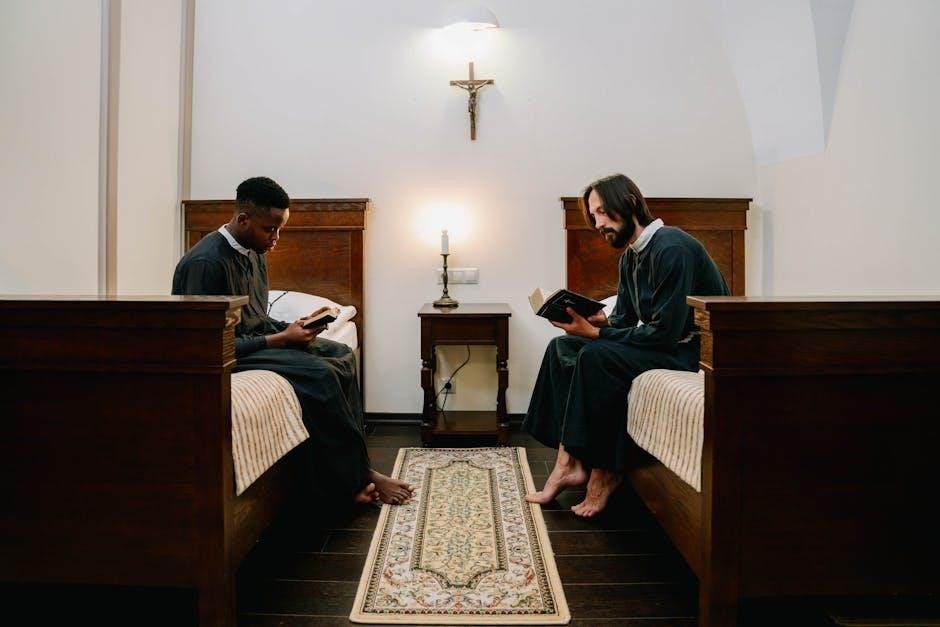Welcome to the world of Catholic Bible study, a journey to deepen your faith and understanding of Scripture through a rich, tradition-filled approach.
Discover essential resources like the Catholic Study Bible (NABRE) and The Didache Bible (RSV-2CE), designed to guide you in exploring God’s Word with a Catholic perspective.
Learn how to integrate faith, history, and community into your study, fostering a deeper connection with the Bible and its relevance to everyday life.
What is a Catholic Bible Study Guide?
A Catholic Bible study guide is a resource designed to help deepen understanding of Scripture through a Catholic lens, offering commentary, historical context, and theological insights.
These guides often include explanations of doctrines, references to Church teachings, and practical applications for daily life, making Scripture more accessible and relevant for Catholics.
Approved by Catholic authorities, they provide a structured approach to studying the Bible, fostering spiritual growth and a stronger connection to Catholic traditions and practices.
Why Study the Bible in a Catholic Context?
Studying the Bible in a Catholic context enriches your understanding of the faith, connecting Scripture to Church teachings, traditions, and sacraments.
It deepens your relationship with God, fosters a sense of community, and helps you apply biblical teachings to everyday life.
Exploring the Bible through a Catholic lens provides a holistic view of Salvation History, emphasizing the unity of Old and New Testaments and their relevance to Catholic beliefs and practices.

Essential Resources for Catholic Bible Study
The Catholic Study Bible (NABRE) and The Didache Bible (RSV-2CE) are indispensable, offering insightful commentaries, cross-references, and connections to Catholic teachings and traditions.
Catholic Study Bible (NABRE)
The Catholic Study Bible (NABRE) is a comprehensive resource published by Oxford University Press, offering a deeply Catholic perspective with USCCB approval. It features a 574-page Reading Guide, extensive footnotes, cross-references, and a glossary, making it ideal for scholarly and personal study. Maps and lectionary readings further enhance its utility, providing historical and liturgical context. This Bible is a cornerstone for understanding Scripture within the Catholic tradition, connecting readers to the Church’s teachings and practices.

The Didache Bible (RSV-2CE)
The Didache Bible (RSV-2CE) is a conservative Catholic study Bible rooted in the Revised Standard Version, Second Catholic Edition. It is extensively cross-referenced with the Catechism of the Catholic Church, offering clear explanations of theological concepts. This Bible includes apologetic explanations, maps, and a glossary, making it a valuable tool for understanding Scripture through a Catholic lens. Its thorough annotations and connections to Church teachings make it ideal for deepening faith and addressing common questions.

Tools for Deeper Study: Commentaries and Online Resources
Enhance your Catholic Bible study with commentaries like Catena Aurea and works by scholars such as Dr. Scott Hahn and Dr. Brant Pitre. Online resources like the St. Paul Center offer free Bible studies, reflections, and historical insights. Utilize digital platforms and apps from Ignatius Press and the Augustine Institute for audio commentaries and guided studies. These tools provide deeper theological context and help integrate Church teachings into your Scripture understanding, fostering a richer faith journey.

Preparing for Bible Study
Preparing for Bible study involves setting clear goals, creating a quiet and focused environment, and gaining foundational knowledge of Scripture to deepen faith and understanding.
Setting Goals for Your Study
Setting clear goals for your Catholic Bible study helps maintain focus and motivation. Start by identifying specific objectives, such as understanding a particular book, exploring a theological theme, or applying biblical teachings to daily life. Break your goals into manageable steps, ensuring they align with your faith journey. Regular reflection and adjustment of these goals will deepen your engagement and spiritual growth over time.
Creating a Conducive Study Environment
Create a quiet, distraction-free space for Bible study, fostering focus and reflection. Ensure access to essential resources like the Catholic Study Bible (NABRE) or The Didache Bible (RSV-2CE). Utilize tools such as commentaries, online resources, and a journal for note-taking. A well-prepared environment enhances your ability to engage deeply with Scripture, promoting spiritual growth and a meaningful connection with God’s Word.
Gaining Basic Knowledge of Scripture
Gaining basic knowledge of Scripture is essential for meaningful Catholic Bible study. Start by familiarizing yourself with the Bible’s structure, key themes, and central events. Focus on understanding the Old Testament’s foundation, including creation, covenant, and redemption, and the New Testament’s revelation of Jesus Christ. Begin with the Gospels to encounter Christ’s life and teachings. Use resources like the Catholic Study Bible and commentaries to enhance your understanding and deepen your faith.

Understanding the Structure of the Bible
The Bible is divided into the Old and New Testaments, with the Old Testament laying the sacred foundation of God’s covenants and promises, and the New Testament revealing Jesus Christ and the Church.
The Four Senses of Scripture
The Catholic Church teaches that Scripture can be understood through four senses: literal, allegorical, moral, and anagogical. The literal sense seeks the historical or factual meaning, while the allegorical uncovers spiritual truths, such as the Cross symbolizing salvation. The moral sense applies Scripture to daily life, and the anagogical points to eternal realities, like heaven. These senses enrich Bible study, offering a deeper, holistic understanding of God’s Word.
Old Testament vs. New Testament
The Old Testament reveals God’s plan through creation, covenants, and prophets, while the New Testament fulfills this plan in Jesus Christ. The Old Testament prefigures the New, as seen in types like the Passover foreshadowing the Eucharist. Together, they form one unified story of salvation, with the Old preparing for Christ’s coming and the New testifying to His life, death, and resurrection, establishing the Church and sacraments.
Practical Steps for Effective Study
Start with prayer, choose a study method, and engage deeply with the text. Set clear goals, use commentaries, and apply teachings to daily life for spiritual growth.
Choosing a Study Method
Explore various methods to suit your learning style, such as individual reading, group discussions, or guided programs; Consider using lectio divina for a prayerful approach or structured guides for deeper analysis. Online resources like commentaries and video teachings can enhance your study. Setting clear goals and staying consistent will help you progress. Whether you prefer flexibility or structured plans, choose a method that fosters engagement and spiritual growth.
Engaging with the Text: Lectio Divina
Lectio Divina, or divine reading, is a traditional Catholic method for engaging with Scripture. This four-step practice involves lectio (reading), meditatio (reflection), oratio (prayer), and contemplatio (contemplation). It encourages a slow, prayerful encounter with the text, fostering a deeper connection to God’s Word and its application in daily life.
This ancient practice helps believers move beyond intellectual understanding to a heartfelt, transformative experience of Scripture.
Applying Biblical Teachings to Daily Life
Catholic Bible study encourages believers to live out Scripture in everyday life. By reflecting on biblical teachings, individuals can discern God’s will, make moral decisions, and grow in virtue. Prayer, reflection, and community support help integrate faith into daily actions, fostering a life rooted in Christ’s love and transformative power.

Incorporating Catholic Tradition
Catholic Bible study is enriched by tradition, blending Scripture with the teachings of the Church, writings of Church Fathers, and insights from modern scholars, fostering a deeper connection to the faith.
The Role of the Catechism
The Catechism of the Catholic Church serves as a foundational resource for Bible study, linking Scripture to official Church teachings and traditions. It provides essential context for understanding doctrines, moral principles, and the sacraments, while connecting biblical passages to the Church’s rich heritage. By referencing the Catechism, Catholics can deepen their grasp of how Scripture informs their faith and daily lives, fostering a more informed and faithful living of Catholicism.
Learning from Church Fathers and Scholars
Exploring the writings of Church Fathers and modern scholars enriches Bible study by providing timeless insights and expert commentary. Their works bridge Scripture with Catholic doctrine, offering historical and theological context. Scholars like Dr. Scott Hahn and Fr. Mitch Pacwa provide accessible explanations, while Church Fathers like St. Augustine and St. Thomas Aquinas offer profound reflections. Their contributions deepen understanding and connect biblical teachings to Catholic traditions and daily life.

Joining a Bible Study Group
Joining a Catholic Bible study group fosters fellowship, shared insights, and accountability, enriching your spiritual journey through collaborative learning and community support.
Benefits of Community Study
Engaging in Catholic Bible study with others offers numerous benefits, including shared insights, accountability, and spiritual growth. Community study fosters deeper understanding through diverse perspectives and collective prayer. It also provides emotional support and encouragement, helping participants stay committed to their faith journey. Additionally, group discussions can clarify complex teachings and inspire practical application of biblical truths in daily life, strengthening both individual and communal faith.
How to Find or Start a Group
To find or start a Catholic Bible study group, begin by contacting your parish office for existing groups or resources. Consider programs like Walking with Purpose or Six Weeks with the Bible, designed for community learning; Utilize online tools from the St. Paul Center or Ignatius Press for structured study materials. Consistency and prayer are key to fostering a supportive and spiritually enriching environment for all participants.
Catholic Bible study is a transformative journey, deepening faith and enriching spiritual life. Embrace prayer, community, and the Church’s teachings to apply Scripture meaningfully each day.
Summarizing Key Points
A Catholic Bible study guide offers a structured approach to understanding Scripture through a faith-filled lens. Essential resources like the Catholic Study Bible (NABRE) and The Didache Bible (RSV-2CE) provide scholarly insights and connections to Church teachings. Tools such as commentaries, online resources, and the Catechism enhance deeper study. Community engagement, prayer, and applying biblical teachings to daily life are vital for a fruitful experience. Embrace tradition, seek guidance from Church Fathers, and stay committed to ongoing spiritual growth through Scripture.
Encouragement for Ongoing Study
Embrace the journey of Catholic Bible study with enthusiasm and perseverance. Scripture is a living Word that illuminates faith and guides daily life. Regular study fosters spiritual growth and deepens your relationship with God. Engage with resources like commentaries, online tools, and community groups to stay inspired. Reflect on Scripture daily, and let its teachings transform your heart and actions. Remember, every moment spent in study is an investment in eternal wisdom and grace.

Recommended Materials and Further Reading
Explore the Catholic Study Bible (NABRE) and The Didache Bible (RSV-2CE) for deeper insights. Utilize study guides, commentaries, and online resources like Ignatius Press and Augustine Institute for enriched study.
Key Bible Study Resources
Essential resources include the Catholic Study Bible (NABRE) and The Didache Bible (RSV-2CE), offering detailed commentary, maps, and cross-references. Utilize tools like Ignatius Press study guides, Augustine Institute audio resources, and Dr. Scott Hahn’s commentaries for deeper insights. Additionally, online platforms like the St. Paul Center provide free Bible studies, reflections, and catechetical materials to enrich your understanding of Scripture.
Suggested Study Guides and Commentaries
Explore Walking with Purpose, a women’s Bible study, and From Now On, a Lenten guide by Dr. Brant Pitre. Jeff Cavins and Edward Sri offer insightful programs. Dr. Scott Hahn’s commentaries and the Augustine Institute’s audio resources provide depth. Seasonal guides like Dr. Pitre’s Advent devotional enrich study. These tools, alongside the St. Paul Center’s free materials, offer a rich foundation for understanding Scripture.







